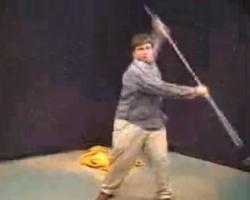‘Star Wars Kid’ Was Internet Meme and Cyberbully Victim
Get downloadablel PowerPoint presentation.
What Happened:
In late 2002, Canadian 14-year-old Ghyslain Raza made a little video of himself twirling around a stick, trying to mimic the ultra-cool moves of Darth Maul in Star Wars: The Phantom Menace. Little did he know it would make him famous—and miserable.
After some classmates posted the video to the Internet without his knowledge in 2003, Raza became known as “Star Wars Kid,” one of the Internet’s first real video memes. The clip quickly went viral, being mocked on everything from “Family Guy” to “The Colbert Report.” “Star Wars Kid” predated YouTube; thus, it has only 27 million views on the site (not to mention 100,000 comments). Yet one estimate suggests the video has been seen 900 million times.
For Raza, Internet fame was humiliating. “In the common room, students climbed onto tabletops to insult me,” he tells MacLean’s. “No matter how hard I tried to ignore people telling me to commit suicide, I couldn’t help but feel worthless, like my life wasn’t worth living.”
Raza says the attention he received was so damaging that he was forced to drop out of school. He grew depressed and was sent to a children’s psychiatric ward. Raza, it turns out, was one of the first real victims of what has become known as cyberbullying.
After years of trying his best to avoid attention, Raza—a law-school graduate—is now speaking out, hoping to encourage others to move past their own run-ins with cyberbullies.
“You’ll survive,” he says. “You’ll get through it. And you’re not alone. You are surrounded by people who love you.”
Talk About It:
Many of us have probably seen “Star Wars Kid.” Those of us who’ve seen it probably laughed, but Raza’s story shows us that sometimes what we think might be an innocent chuckle can be a painful, scarring experience for the person or people we’re laughing at—and it doesn’t need to be seen by millions to be embarrassing and hurtful.
Embarrassing videos are a huge part of YouTube’s content. Have you seen such videos? Have you made such videos? Have you ever been an unwilling subject of that sort of video? Do you know someone who’s been mocked on video?
We all know laughing at someone’s misfortune isn’t something we should do, but there are shades of gray. Raza didn’t post the video himself; but if he had, would you feel greater freedom to laugh? Do you think that sometimes people who embarrass themselves on YouTube deserve to be mocked? If so, when?
Almost all of us probably have made fun of someone and felt badly about it later. Almost all of us probably have been made fun of and felt badly period. If you feel comfortable sharing a story with your group, do so. Have you ever mocked someone at school when you shouldn’t? Have you ever had a chance to make it up to that person? Have you ever been mocked? Did you get over the embarrassment? If so, how?
What the Bible Says:
“You have heard that it was said, ‘Love your neighbor and hate your enemy.’ But I tell you, love your enemies and pray for those who persecute you, that you may be children of your Father in heaven. He causes His sun to rise on the evil and the good, and sends rain on the righteous and the unrighteous. If you love those who love you, what reward will you get? Are not even the tax collectors doing that? And if you greet only your own people, what are you doing more than others? Do not even pagans do that? Be perfect, therefore, as your heavenly Father is perfect” (Matthew 4:43-48).
“For the Spirit God gave us does not make us timid, but gives us power, love and self-discipline” (2 Timothy 1:7).
“Do not seek revenge or bear a grudge against anyone among your people, but love your neighbor as yourself. I am the Lord” (Leviticus 19:18).
“Be strong and courageous. Do not be afraid or terrified because of them, for the Lord your God goes with you; he will never leave you nor forsake you” (Deuteronomy 31:6).
Paul Asay has covered religion for The Washington Post, Christianity Today, Beliefnet.com and The (Colorado Springs) Gazette. He writes about culture for Plugged In and wrote the Batman book God on the Streets of Gotham (Tyndale). He lives in Colorado Springs with wife, Wendy, and two children. Follow him on Twitter.




